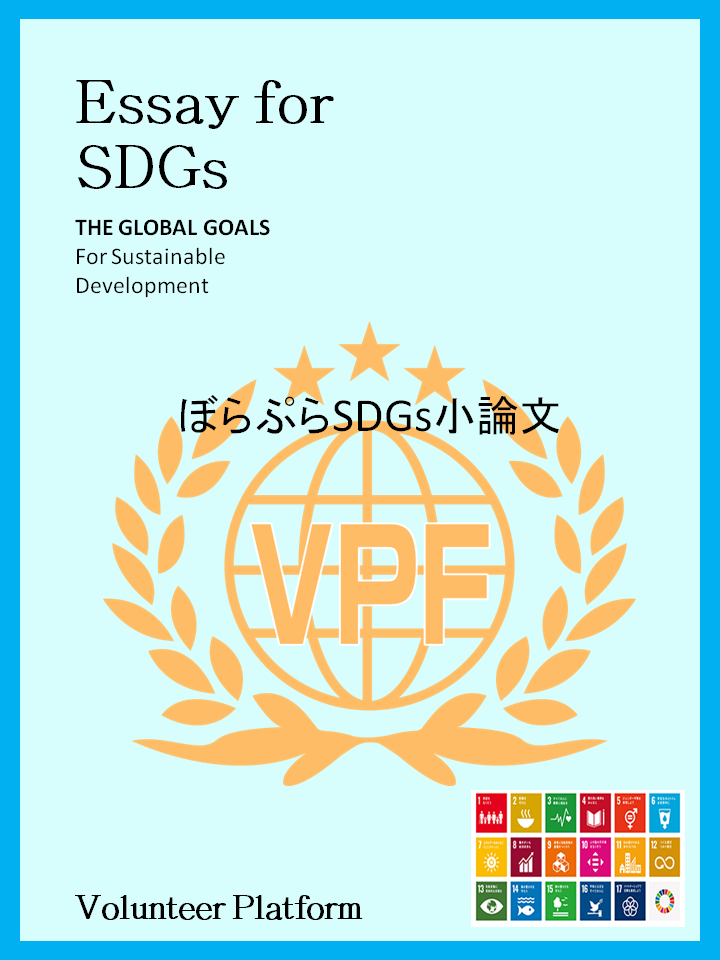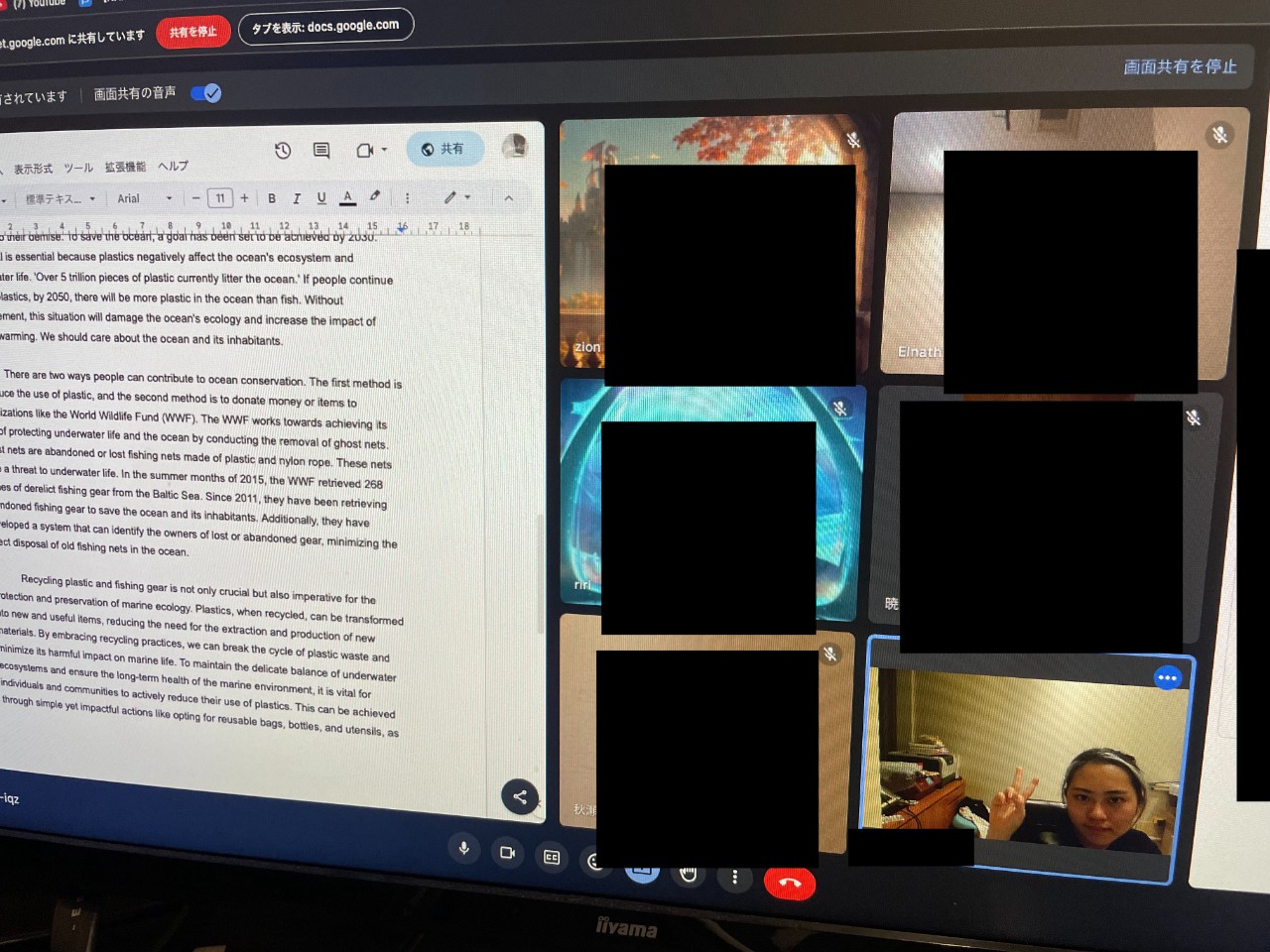[ぼらぷらSDGs小論文]

『Life Below Water』
プレゼン動画
プレゼン資料
※動画内のスライドが見にくい方は、こちらをご確認ください
小論文
『Life Below Water』
People use an average of 13,000 pieces of plastic litter per square kilometer of the ocean. However, most people don't realize that this is a serious problem. Goal 14, 'Life Below Water,' from the United Nations Sustainable Development Goals, aims to protect underwater life and mitigate the impact of global warming. This is crucial because many people are unaware that the ocean is essential to human life, and the use of plastics ultimately leads to their presence in the ocean. The ocean is indispensable for humans, but if people continue to use plastics, it will accelerate the impact of global warming and result in the ocean being filled with plastic waste.
Goal 14, 'Life Below Water,' faces a significant challenge, which is plastic pollution. Plastics endanger underwater life, as some organisms become entangled in or consume plastics, leading to their demise. To save the ocean, a goal has been set to be achieved by 2030. This goal is essential because plastics negatively affect the ocean's ecosystem and underwater life. 'Over 5 trillion pieces of plastic currently litter the ocean.' If people continue to use plastics, by 2050, there will be more plastic in the ocean than fish. Without improvement, this situation will damage the ocean's ecology and increase the impact of global warming. We should care about the ocean and its inhabitants.
There are two ways people can contribute to ocean conservation. The first method is to reduce the use of plastic, and the second method is to donate money or items to organizations like the World Wildlife Fund (WWF). The WWF works towards achieving its goal of protecting underwater life and the ocean by conducting the removal of ghost nets. Ghost nets are abandoned or lost fishing nets made of plastic and nylon rope. These nets pose a threat to underwater life. In the summer months of 2015, the WWF retrieved 268 tonnes of derelict fishing gear from the Baltic Sea. Since 2011, they have been retrieving derelict fishing gear to save the ocean and its inhabitants. Additionally, they have developed a system that can identify the owners of lost or abandoned gear, minimizing the direct disposal of old fishing nets in the ocean.
Recycling plastic and fishing gear is not only crucial but also imperative for the protection and preservation of marine ecology. Plastics, when recycled, can be transformed into new and useful items, reducing the need for the extraction and production of new materials. By embracing recycling practices, we can break the cycle of plastic waste and minimize its harmful impact on marine life. To maintain the delicate balance of underwater ecosystems and ensure the long-term health of the marine environment, it is vital for individuals and communities to actively reduce their use of plastics. This can be achieved through simple yet impactful actions like opting for reusable bags, bottles, and utensils, as well as choosing products with minimal packaging. However, reducing plastic use alone is not enough. Proper recycling of plastic waste is equally crucial. By separating recyclable plastics from other waste and ensuring they are sent to recycling facilities, we can give these materials a new lease on life. This process helps to conserve resources, minimize pollution, and prevent plastic from ending up in landfills or, worse, finding its way into rivers and oceans. If we fail to address the issue of plastic pollution, projections indicate that by 2050, there will be more waste plastic in the ocean than fish. This shows that this problem is very urgent and we have to take action immediately in order to solve the issue. By embracing sustainable practices, such as reducing plastic consumption and recycling waste, we can prevent further accumulation of plastic debris in our oceans, safeguard the marine food chain, and protect the countless species that depend on these ecosystems for their survival.
By raising awareness, implementing effective waste management strategies, and taking initiatives like donating to organizations and recycling, we can actively contribute to a healthier and more sustainable future for our oceans and all the living creatures that call them home. Let's protect the ocean by recycling and using fewer plastics!
発表会の様子

オンライン研修を受講した感想
総合的な満足度
満足

受講前の気持ち
SDGsについて学びたい
受講後の気持ち
すごく良かった!
研修を受講した理由を教えて下さい
SDGsを自分のこととして捉え、更にこの目標を一人でも多くの人に知ってもらい、みんなで達成する為にもっと知りたいと思ったから。
研修を受講した感想は?
SDGsに関することを詳しく学べた
今後、今回の経験をどのように活かしていきたいですか?
ゴールを達成するために
これから受講される方へアドバイスお願いします!
楽しいです。頑張ってください。





 LINE相談
LINE相談
